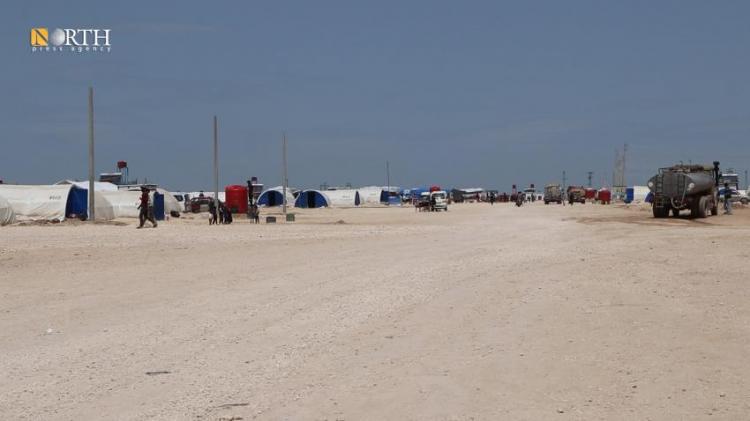Hasakah – Jindar Abdulqader
North-Press Agency
The suffering of the residents of Washo-Kani camp, 12 km west of Hasakah, which includes IDPs from the city of Sere Kaniye (Ras al-Ain) and its countryside, is increasing due to poor services and lack of humanitarian assistance in light of the risks of the outbreak of coronavirus in the areas of northeastern Syria after the number of declared infections reached 38 in areas controlled by the Syrian government.
Camp residents complain about the lack of services such as of food, detergent, poor public facilities, the high cost of living, and the inability to provide many necessities like food and clothing.
Salma al-Wahab, an IDP from the countryside of Sere Kaniye (Ras al-Ain), told North-Press that their situation is bad in light of the lack of food, which was previously better, and the quantity of aid has been decreasing recently. "They delay the distribution of aid during this month, and the quantity of materials included in the food basket is very little with the absence of some basic materials, so we have to buy a lot of our needs,” she said.
Subhi al-Assaf, another IDP from the countryside of Sere Kaniye who resides in Washo-Kani camp, said: "We have been here since the establishment of the camp, and the materials have not arrived as required. We only get bread periodically, in addition to detergents some time ago."
He added that they had previously received cash once and purchased their necessary supplies at that time, noting that it must continue in order for them to support themselves.
The administration of Washo-Kani camp recently held a meeting with all international organizations and local societies operating within the camp, demanding they provide more services to the camp’s residents, especially with the approach of summer and the possibility of spreading epidemics, in addition to the risk of spreading coronavirus.
Regarding the lack of services in the camp and the procedures used to prevent coronavirus, the administrator of Washo-Kani camp, Stera Reshik, said that four tents had been allocated for quarantine inside the camp, and a checkpoint had been set to measure the temperature of those entering the camp, and that all the procedures are correct.
Regarding the quantities of available water and public facilities in the camp, Reshik indicated that in the past, the water situation was somewhat bad because the Turkish forces stopped Alouk Water Station from pumping water to the city of Hasakah and its countryside, but now, the quantity of water is good.
Washo-Kani camp, which was established in November 2019, includes about 11,000 displaced people from Sere Kaniye (Ras al-Ain) after they were displaced from their areas as a result of the Turkish military invasion in northeastern Syria in October last year.

